Ukraine’s General Staff confirms strikes on Syzran oil refinery and Russian command post in Yenakiieve
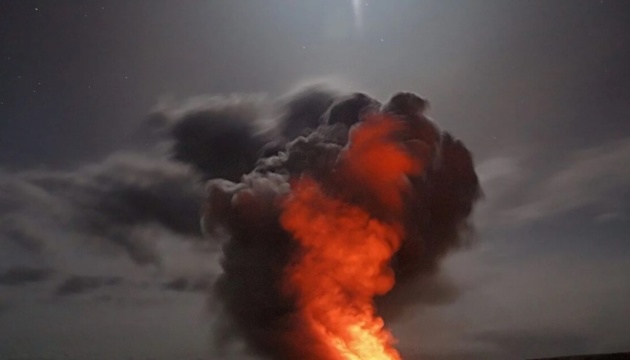


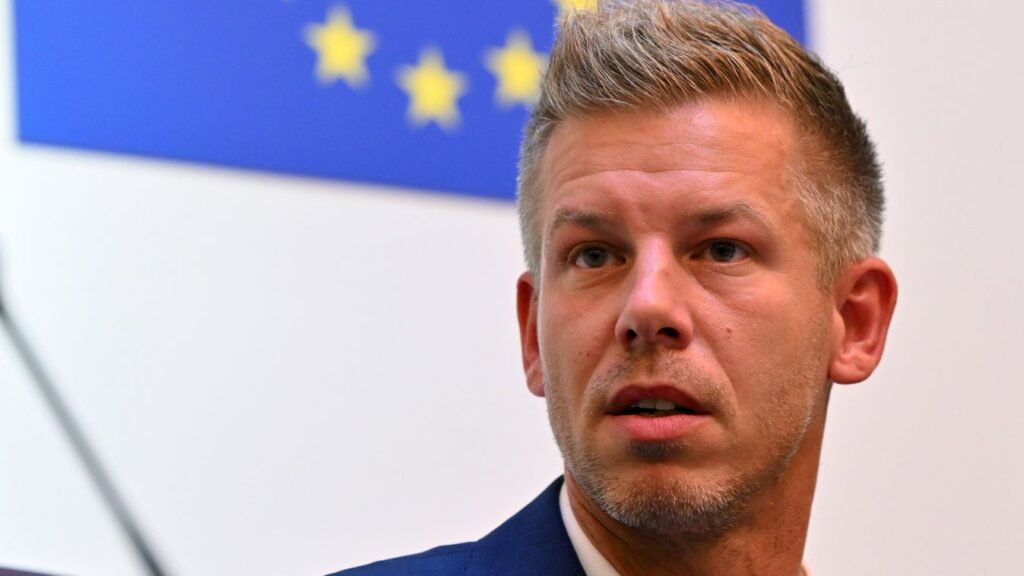

Hungarian opposition leader Péter Magyar has accused Russia of deploying its intelligence services to undermine his campaign against Prime Minister Viktor Orbán, the Kremlin’s closest ally in the European Union. Bloomberg reports that the Kremlin’s Foreign Intelligence Service released a statement portraying Magyar as an alleged stooge of the European Commission, repeating language Orbán has used to attack him.
On 13 August, Russia’s spy agency published the accusations from Moscow, aligning closely with Orbán’s campaign narrative, Bloomberg reports. The next day, Hungarian Foreign Minister Péter Szijjártó backed the Russian claims, saying the statement contained “nothing new.”
Magyar’s Tisza Party currently holds double-digit leads in public opinion polls ahead of elections scheduled for April. The race is unfolding against the backdrop of a sluggish economy and persistent allegations of corruption. Bloomberg notes that Moscow’s involvement is expected to further raise the stakes and reopen debate about Hungary’s position within NATO and the EU, which Orbán has challenged over the past decade.
In a Facebook post, Magyar drew parallels to the Soviet era, recalling the departure of Soviet troops from Hungary in the early 1990s.
“After 34 years, Russia again wants to directly meddle in Hungarian politics, again it wants to unabashedly influence the decision of Hungarian voters,” he wrote.
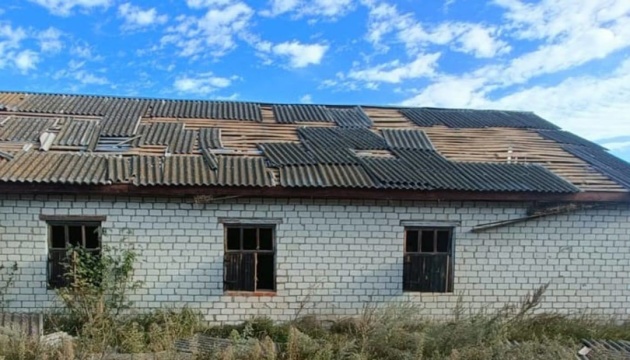

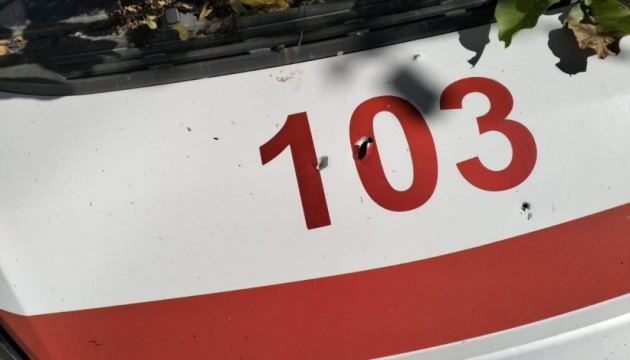



Trump is flying to Anchorage for his meeting with Putin with a team which has no grasp on facts, or truth, and therefore no grasp on reality either, writes world affairs editor Sam Kiley

© AP
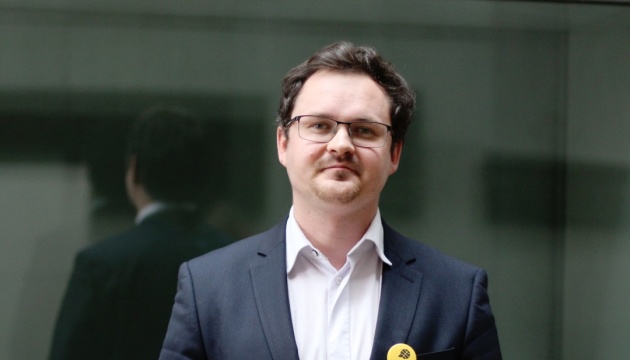


Russian and American delegations have arrived in Alaska ahead of crucial talks later on Friday

© Ukrainian Presidential Press Service
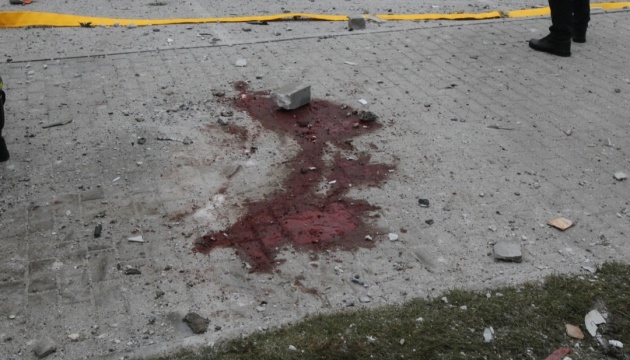


Letter sent to mark anniversary of end of Japan’s colonial occupation of Korea is latest sign of increasingly close ties between two leaders

© POOL/AFP via Getty Images
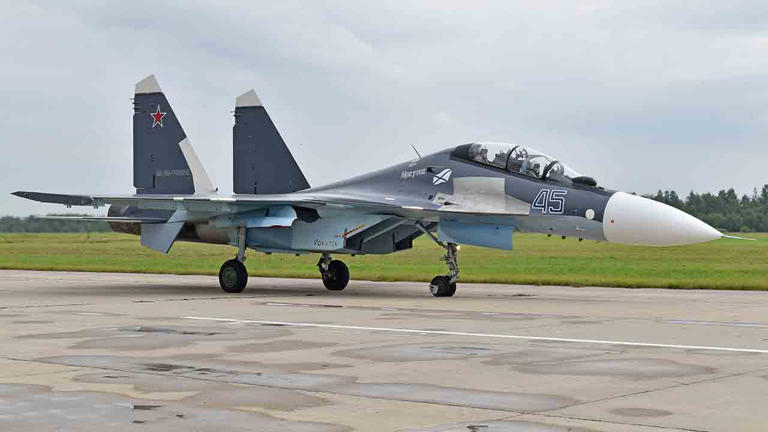

Ukraine’s campaign to erode Russian air power in the Black Sea region has taken a heavy toll on the 43rd Naval Assault Aviation Regiment of the Russian Black Sea Fleet, Militarnyi reports. The regiment, stationed at the occupied Saky airfield in Crimea, began 2022 with a full squadron of 12 Su-30SM multirole fighters. In the three years since the full-scale invasion began, seven of those aircraft have been destroyed in confirmed incidents, with two more damaged. The unit’s fleet has been reduced to less than half its original strength.
Since the start of Russia’s full-scale invasion in February 2022, Ukraine has been targeting Russian military aviation with all available means, including cruise missiles, man-portable air-defense systems, other anti-air weapons, sabotage, and long-range drones. The Russian-occupied Crimean Peninsula often becomes a target for long-range attacks, where the Ukrainian hit Russian air defense assets, Navy ships, and other military installations and equipment.
According to Militarnyi, the 43rd regiment’s first confirmed Su-30SM loss occurred on 5 March 2022 over Mykolaiv Oblast. Both crew members ejected and were taken prisoner. One of them, Major Oleksii Holovenskyi, was the squadron commander at the time. The other, Captain Aleksei Kozlov, served as the aircraft’s navigator. This loss marked the beginning of a series of blows to the unit.
Just months later, on 9 August 2022, Ukrainian Security and Defense Forces struck the Saky airfield, which had been captured by Russia after 2014 and became home to the regiment under military unit number 59882. The attack destroyed three Su-30SMs outright and damaged another. The same strike also destroyed five Su-24 bombers and damaged three more, inflicting serious damage on the regiment’s overall combat capabilities.
The Russian regiment’s losses continued into 2024. On 11 September, Militarnyi reports, Russian forces lost contact with a Su-30SM around 5 a.m. The Ukrainian Main Intelligence Directorate (HUR) later confirmed that a special operations unit had downed the aircraft using a man-portable air-defense system.
In 2025, Ukraine introduced new tactics that marked a milestone in aerial warfare. On 2 May, working jointly with the Security Service of Ukraine and other defense forces, HUR targeted another Su-30SM in the Black Sea. The aircraft was destroyed by an AIM-9 missile launched from a maritime drone — the first recorded instance in history of a manned aircraft being shot down by such a platform.
The most recent confirmed loss was reported by the Ukrainian Navy yesterday, on 14 August 2025. According to the Navy, its intelligence service intercepted Russian radio communications revealing the sudden loss of contact with a Su-30SM southeast of Zmiinyi (Snake) Island in the Black Sea. Defense Express reports that the aircraft crashed under still-unclear circumstances while on a combat mission.

Intercepted communications indicated that Russian forces launched a search-and-rescue operation in the area. Ukrainian Navy statements said wreckage had been spotted floating on the sea surface, but there was no confirmed information on the fate of the pilots. Russian rescuers have not reported recovering either crew member.
Militarnyi notes that in addition to the seven destroyed Su-30SMs, the regiment has suffered damage to two others. One was damaged during the August 2022 strike on Saky airfield, while another was hit on 1 July 2025 by a long-range Ukrainian UJ-26 Bober drone in another attack on the same base.
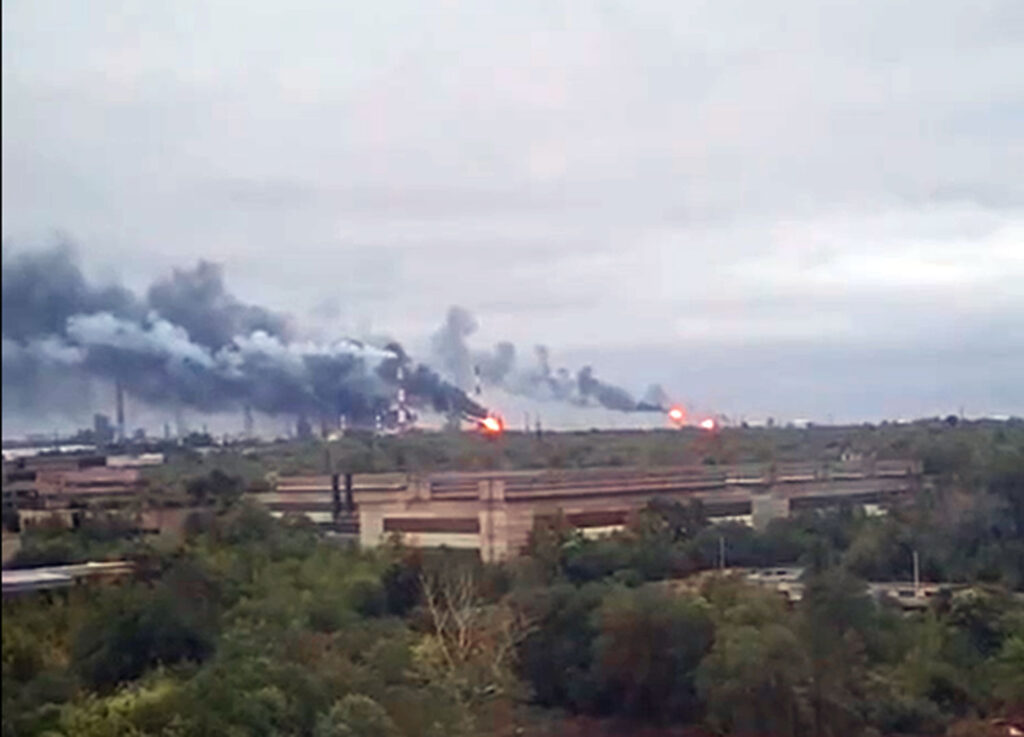

Overnight on 15 August, drones struck the Rosneft-owned oil refinery in Syzran, Samara Oblast, sparking large fires at the facility. Located about 800 km from the front line, the plant is a major fuel supplier for both civilian needs and Russian military forces. The attack prompted emergency measures, including airspace closures and restrictions on mobile internet access across the region.
Media reports and social media posts, including videos shared by the Ukrainian Telegram channel Exilenova+, showed multiple fires and heavy smoke rising from the refinery after the strike. Residents said the first explosions occurred around 04:00, with at least ten blasts heard in total. The footage captured several points of fire and dense black smoke billowing over the complex.
Samara Oblast governor Vyacheslav Fedorishchev claimed that Russian forces destroyed 13 drones and did not confirm any damage to the facility. He announced that the “Kovyor” emergency plan had been activated, grounding aircraft and closing airspace, and that mobile internet restrictions were in place “for public safety.” Residents, however, reported ongoing fires at the refinery.
The Syzran refinery processes about 8.9 million tons of crude oil annually, producing gasoline, diesel, jet fuel, and bitumen. It supplies fuel to Samara, Saratov, and Penza oblasts, parts of central Russia, as well as airfields and military units of the Central and Southern Military Districts. Damaging the facility disrupts fuel deliveries to Russian occupation forces.
The plant has been attacked before. Ukrainian drones also struck it in February and March this year, causing fires then as well.
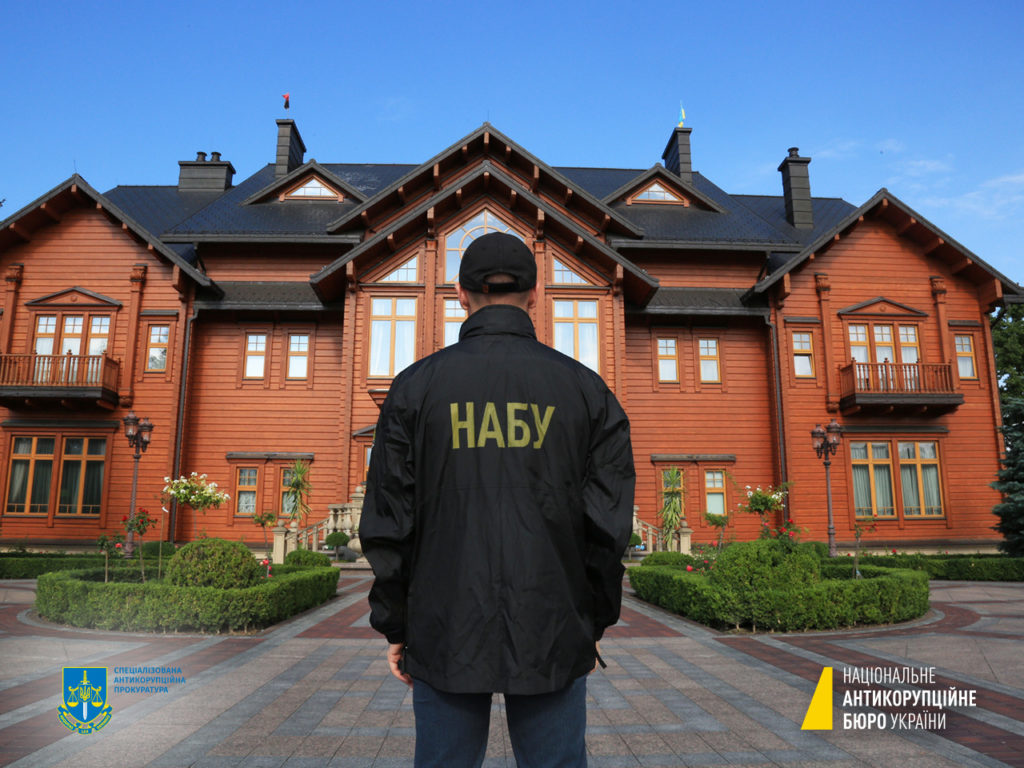

The National Anti-Corruption Bureau (NABU) and Specialized Anti-Corruption Prosecutor’s Office (SAPO) delivered record results in the first half of 2025: 370 new investigations, 115 suspects charged, and 62 convictions — wartime performance that exceeded even their substantial late-2024 numbers. This week, they announced charges against a senior Defense Ministry official accused of soliciting $1.3 million in bribes to rig military housing contracts.
Yet simultaneously, a parliamentary commission has begun examining their work, a timing that raises questions about the government’s true intentions.
The question isn’t whether NABU and SAPO can function — they clearly can — but whether they can work undisturbed when the same political forces that tried to subordinate them in July remain in power, wielding the same administrative tools that could disrupt sensitive investigations.
The agencies formally regained their independence on 31 July after mass protests forced parliament to reverse controversial Law 12414. But the nine-day subordination to the Prosecutor General wasn’t an isolated misstep — it was the culmination of pressure that had been building since NABU charged former Deputy Prime Minister Oleksiy Chernyshov, a member of President Volodymyr Zelenskyy’s inner circle.
What made July different wasn’t just the attempt to strip institutional independence. It was how quickly UAH 120 million ($2.9 million) appeared for Chernyshov’s bail, and how rapidly 70 raids materialized against NABU officials when the agencies refused to back down.
The message was clear: there are limits to how close anti-corruption investigations can get to the president’s political family.
The speed of that bailout also raised uncomfortable questions in Brussels, where officials watching Ukraine’s EU accession bid wondered how deep corruption networks run.
Since then, nothing fundamental has changed.
The same officials who designed Law 12414 remain in office. The same networks that mobilized Chernyshov’s bail remain intact. And crucially, parliament left three dangerous provisions that weaken the broader prosecutorial system.
While NABU and SAPO regained their statutory independence, the government retained legal mechanisms that could still disrupt their work:
The government can’t longer directly control NABU and SAPO, but it can create pressure points. Many high-profile corruption cases involve multiple jurisdictions. The Prosecutor General can, for example, influence sensitive investigations without formally touching the agencies’ autonomy by controlling appointments, reassigning personnel, or pulling case materials.
As the Agency for Legislative Initiative warned, the ability to appoint prosecutors without competition “undermines selection standards, contradicts the principle of prosecutorial independence, and creates risks for the legitimacy of personnel decisions.”
EU officials welcomed NABU’s and SAPO’s restored independence, but of course, they’re keenly tracking whether administrative pressure continues. Any perception that Ukraine’s anti-corruption institutions operate under political constraint could slow accession talks just as they gain momentum — exactly when Ukraine needs the perspective of a future EU membership most.
For Brussels, the July crisis and its aftermath matter beyond Ukrainian domestic politics.
The EU has made competitive selection for top prosecutorial positions a condition for Ukraine’s 2026 accession timeline. The current law doesn’t meet that requirement.
Beyond formal legal tools, the government has other ways to signal displeasure. The parliamentary commission examining NABU and SAPO, launched just weeks after their independence was restored, exemplifies this approach.
Commission chair Serhiy Vlasenko insisted the timing was coincidental, telling the news outlet Glavcom that the idea to create such a commission had been with him for a long time because, according to him, corruption had increased many times over in the last ten years.
Then there’s the case of appointing leading NABU investigator Oleksandr Tsyvinskyi to head the Bureau of Economic Security (BEB), which only materialized under external pressure tied to Western aid packages.
Earlier this month, the government finally appointed an anti-corruption investigator they had spent months trying to reject — a high-profile example of the bureaucratic obstacles that can impede institutional progress.
This puts Ukrainian civil society in a position of permanent vigilance. The Cardboard Revolution, which forced the government to retreat in July, proved that public mobilization works, but it also showed the limits of partial victories.
Citizens managed to save NABU and SAPO’s headline independence, but the technical changes that enable indirect interference remain.
Nevertheless, NABU’s and SAPO’s continued casework proves the agencies are functional. They seem to pursue major cases without political interference. The Defense Ministry bribery investigation, which began in June, proceeded normally through the July crisis and resulted in charges this week.
But functionality isn’t the same as security. The agencies are working in what amounts to hostile territory — surrounded by political actors who view their independence as a constraint on executive power rather than a democratic achievement.
The real test will accompany the next high-profile case that touches Zelenskyy’s inner circle.
Will investigators proceed with the same determination they showed with Chernyshov? Will the Security Service launch another wave of “anti-Russian” raids against anti-corruption officials?
NABU and SAPO proved Ukrainian civil society can force government retreats.
However, both anti-corruption agencies are still playing defense in a system where the same officials who tried to subordinate them remain in power, holding the same tools and probably the same views.
The next high-profile case touching Zelenskyy’s inner circle will show whether July was a genuine victory or a temporary tactical withdrawal.
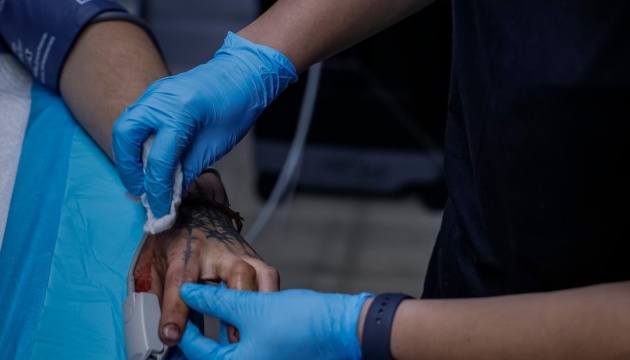

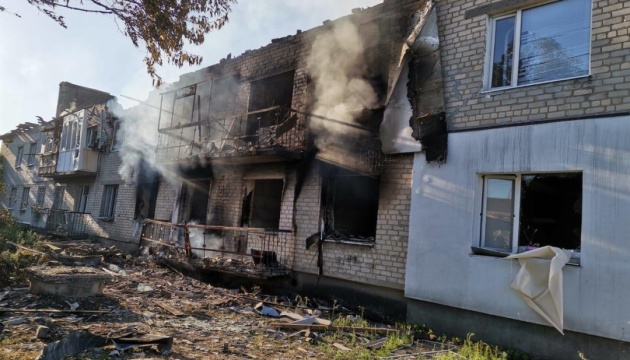

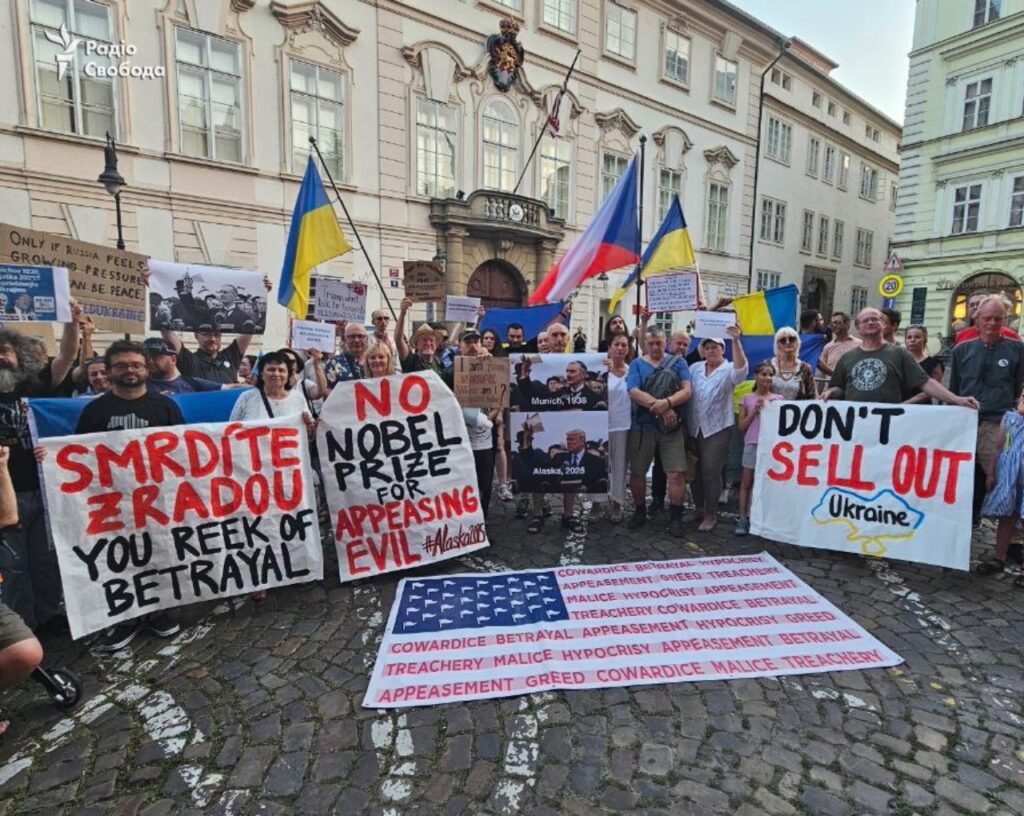

President Donald Trump and Russian President Vladimir Putin are meeting today in Anchorage, Alaska, triggering protests across multiple continents as activists warn against territorial concessions that could reward Russian aggression.
The bilateral summit—Putin’s first visit to US soil in nearly a decade—deliberately excludes Ukrainian President Volodymyr Zelenskyy despite the war being the primary agenda item. Trump has indicated any peace deal will involve “some swapping of territories,” prompting fears of a repeat of 1938’s Munich Agreement.
From Helsinki to Sydney, protesters gathered under banners reading “DON’T SELL OUT UKRAINE” as the Alaska meeting commenced. Finnish demonstrators in Helsinki highlighted the parallels to previous failed appeasement attempts, while crowds in Prague carried signs explicitly referencing “no new Munich.”
“Ahead of the US president’s meeting with war criminal Putin, we call for no new Munichs,” said Vlada Dumenko of the International Center for Ukrainian Victory (ICUV). “Any future peace agreement must comply with international law, including the principles of independence, sovereignty, territorial integrity, and the prohibition of changing borders by force.”
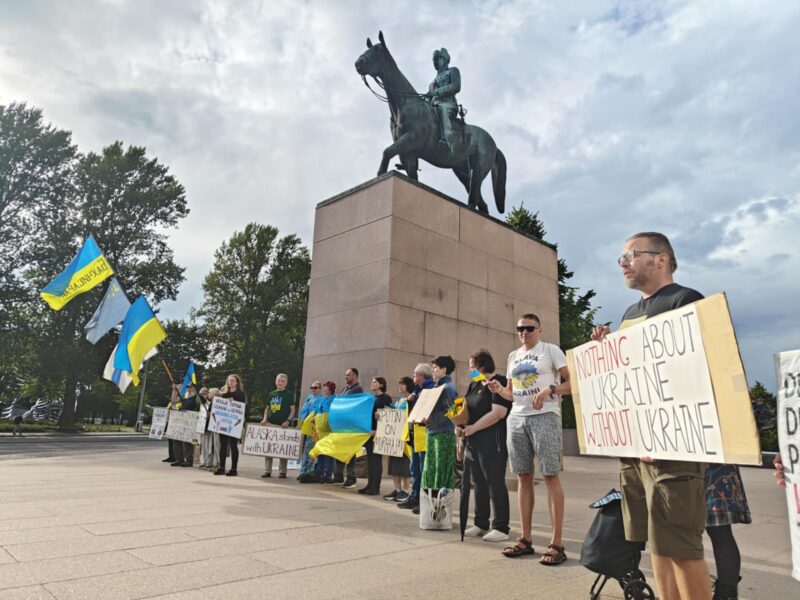
The protests span continents, with demonstrations reported in:
Today’s summit represents Trump’s most significant diplomatic gamble since taking office, coming after his August 8 deadline for Putin to agree to a ceasefire passed without Russian compliance. Instead of imposing the threatened “secondary sanctions,” Trump opted for direct talks in Alaska—a location that Kremlin officials called “quite logical” given its proximity to Russia.
Trump has described the meeting as a “feel-out” session to gauge Putin’s willingness to negotiate, but has already signaled openness to territorial exchanges. “We’re going to get some back, and we’re going to get some switched. There’ll be some swapping of territories,” Trump told reporters.
European leaders issued a joint statement over the weekend insisting “the path in Ukraine cannot be decided without Ukraine,” signed by officials from the UK, France, Italy, Germany, Poland, Finland, and the European Commission.
Ukrainian activists fear the bilateral format gives Putin leverage to push for territorial gains while sidelining Ukrainian input. Any territorial concessions would violate Ukraine’s constitution and require parliamentary approval or a national referendum.
“Nothing about Ukraine without Ukraine,” emphasized Hanna Hopko, chair of the National Interests Advocacy Network ANTS. “If the West is unable to counter this growing threat, it will forfeit its position at the heart of the international security architecture and be replaced by the rising authoritarian powers.”
Hopko argued that rather than territorial concessions, the West already possesses the tools to defeat Russia: “With America providing weapons, Europe holding the $190 billion in frozen Russian sovereign assets, and Ukraine’s Operation Spider Web—we already have the tools to defeat Russia and end this war. What’s needed now is the courage to use them.”
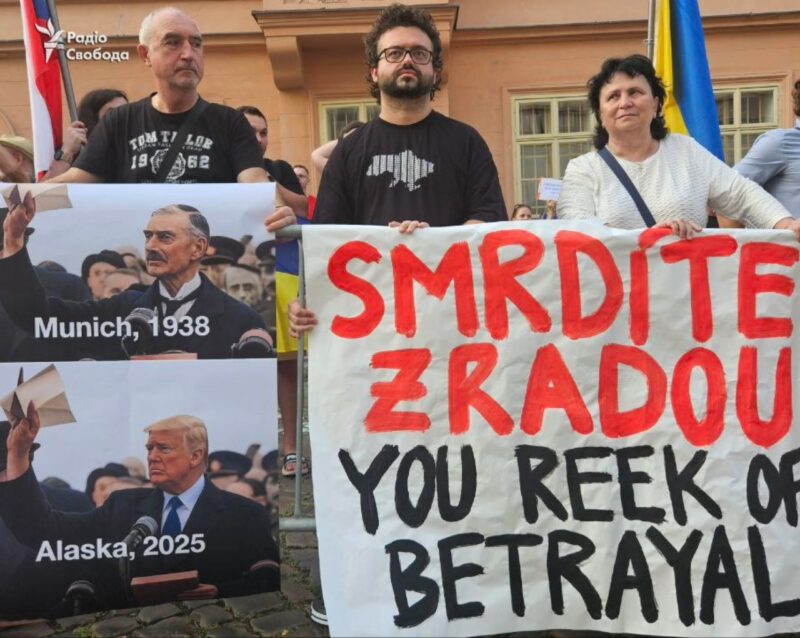
The 1938 Munich Agreement, where Western leaders allowed Nazi Germany to annex parts of Czechoslovakia in exchange for promises of peace, has become a rallying cry for protesters opposing any Ukrainian territorial concessions to Russia.
“Any retreat from Donetsk or Luhansk is not compromise—it is a strategic disaster,” protesters in Prague declared. “It would give Russia a permanent launching pad for future attacks, just as the 1938 Munich Agreement gave Hitler the green light to devour Europe.”
The Ukraine war, now in its fourth year since Russia’s full-scale invasion began in February 2022, has evolved into what officials describe as a broader contest between democratic and authoritarian powers, with North Korean troops fighting alongside Russian forces and Iranian drones striking Ukrainian cities.
White House officials describe today’s meeting as exploratory, with Trump stating he will know “probably in the first two minutes” whether a deal is possible. The president has indicated that successful talks could lead to a follow-up trilateral meeting including Zelenskyy.
However, Putin has shown little willingness to make genuine concessions. Russian forces continue their advance in eastern Ukraine, and Moscow failed to attend previous peace talks in Türkiye despite Ukrainian participation.
As one protester’s sign in Helsinki read: “Today’s leaders must remember that history judges not just intentions, but consequences.”
The summit in Anchorage is expected to conclude this evening, with both leaders potentially making public statements about next steps.
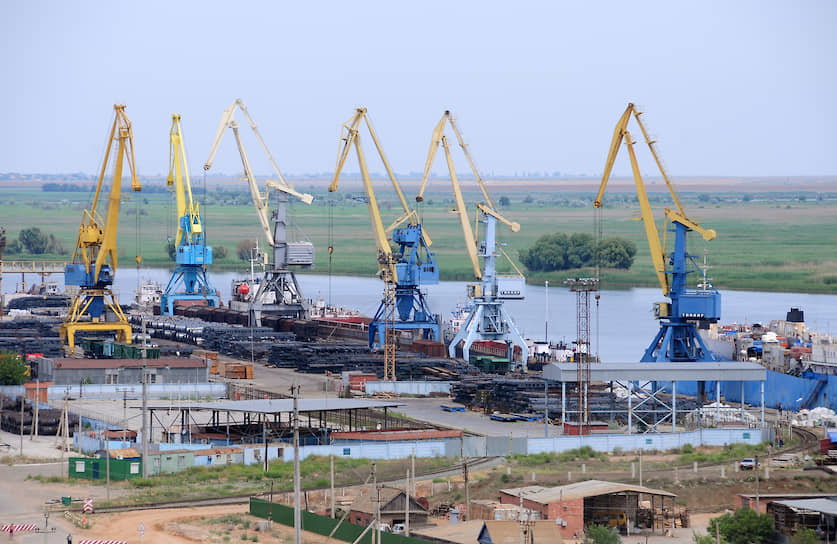

Ukraine’s Special Operations Forces (SSO or SOF) struck Russia’s Olya port in Astrakhan Oblast on 14 August, targeting a vessel reportedly carrying Iranian Shahed drone parts and ammunition. The General Staff of the Armed Forces of Ukraine said the attack was part of efforts to weaken Russia’s ability to carry out airstrikes. Results of the strike are still being assessed.
According to the General Staff, the Olya port facility is used by Russia as an important logistics hub for receiving military goods from Iran.
The targeted vessel, identified as Port Olya 4, was reportedly loaded with Shahed-type drone components and ammunition.
The operation was conducted by Ukraine’s SOF in cooperation with other branches of the Defense Forces. The military said the goal was to disrupt Russian logistics and degrade its capacity for sustained aerial attacks.
No visual evidence from the area has yet emerged, and Euromaidan Press said it could not independently verify the report.
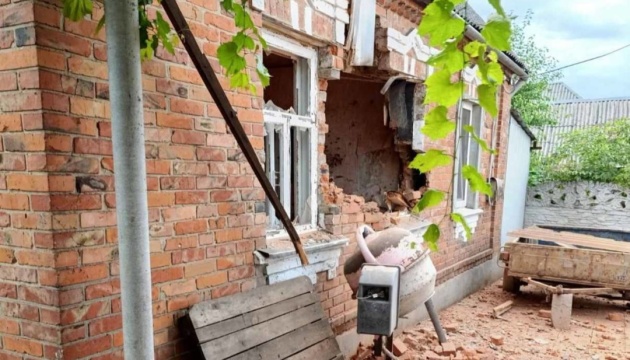

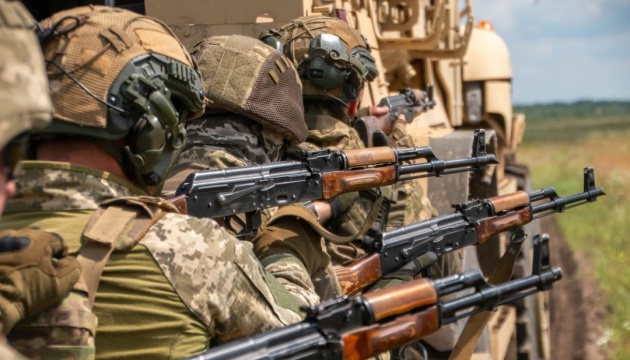

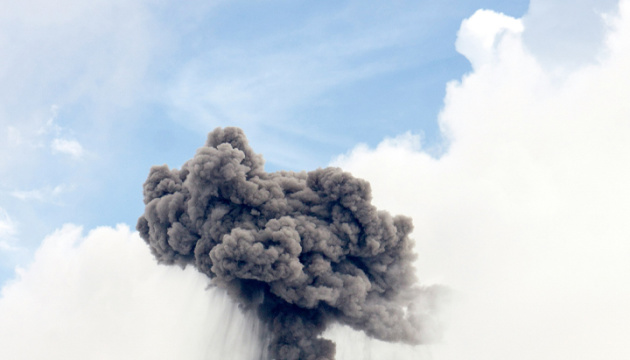

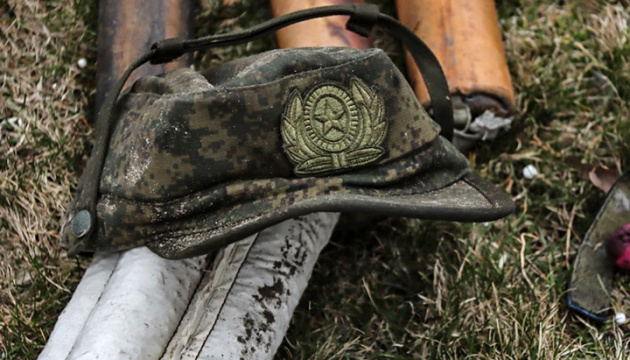

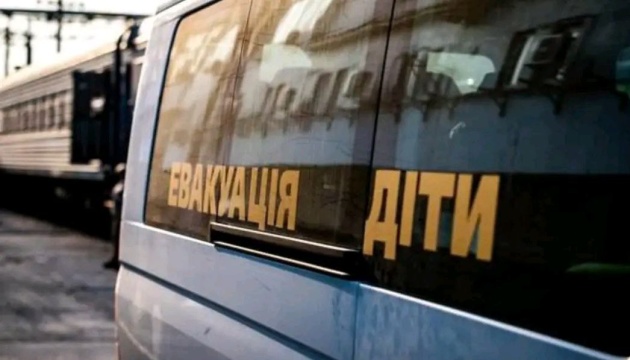

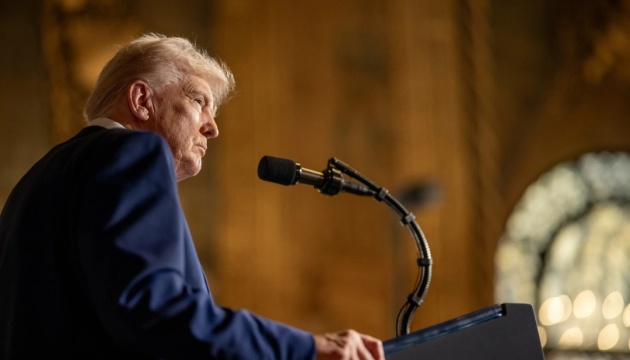

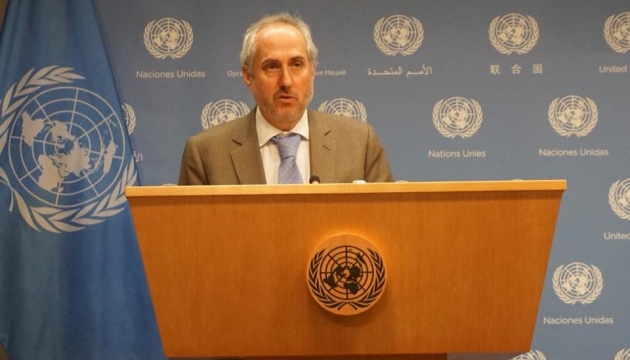

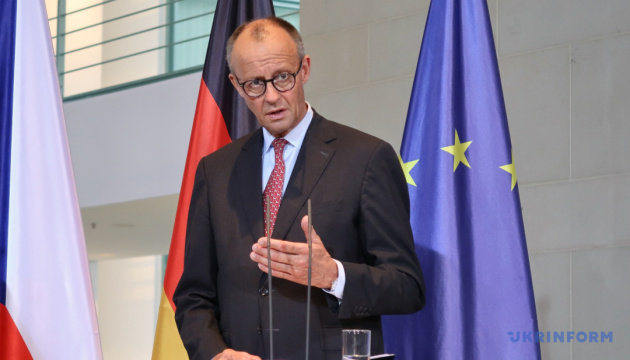

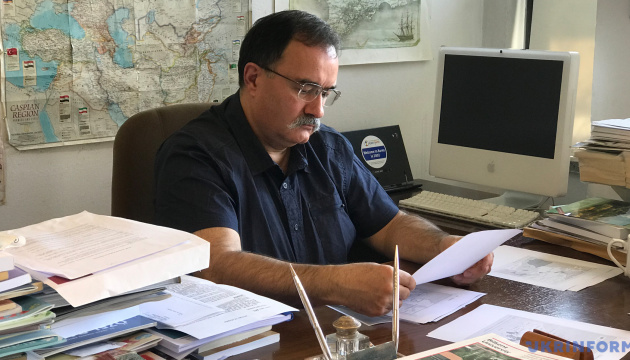

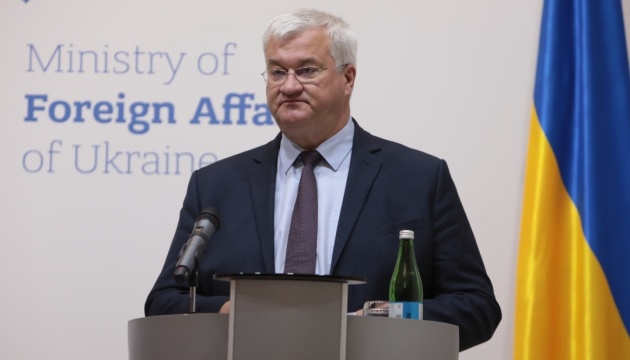



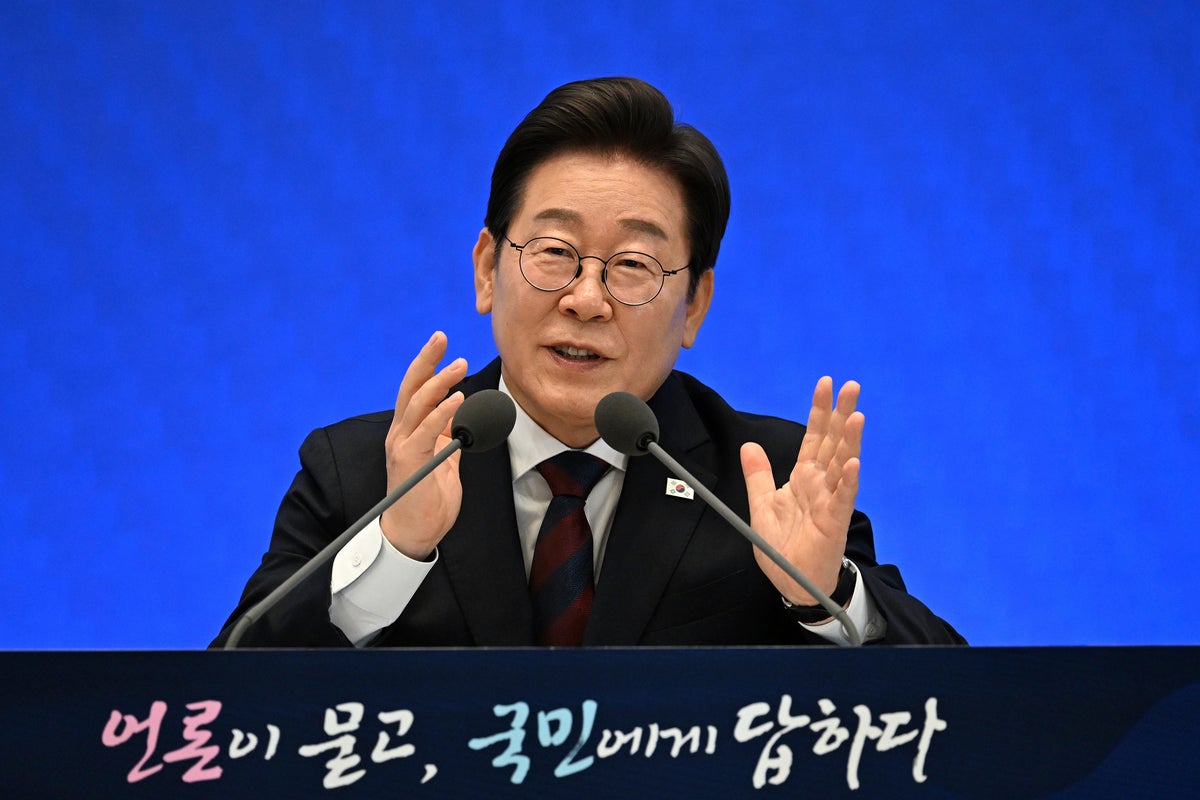

© ASSOCIATED PRESS
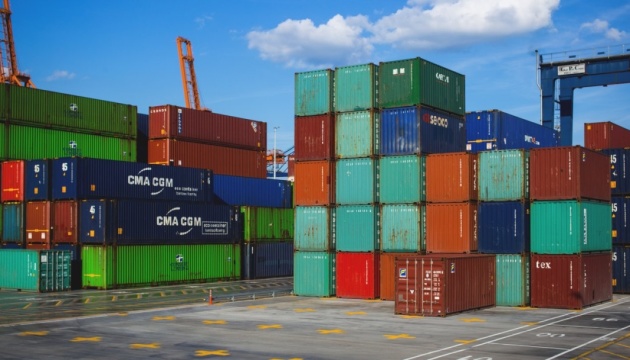



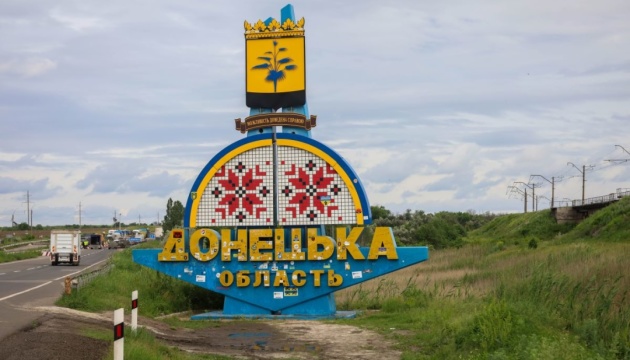


Sir Tony Radakin stressed that ‘Russia is weak’ and that Nato allies needed to demonstrate confidence

© PA


Authorities in Ukraine’s Donetsk Oblast have expanded the mandatory evacuation zone for families with children, adding five new settlements due to intensifying Russian attacks. The decision was announced by Vadym Filashkin, head of the Donetsk Regional Military Administration (RMA), on 14 August.
Druzhkivka, an industrial city of strategic importance, lies about 80 km northeast of Donetsk City and has remained under Ukrainian control since 2014. Once home to nearly 54,000 residents, its population has dropped sharply due to displacement. Its position along key transport routes makes it a vital defensive and logistical hub.
The new mandate covers Druzhkivka, Andriivka, Varvarivka, Novoandriivka, and Rohanske in the Andriivka community, where about 1,879 children currently live.
The evacuation decision followed a meeting of the regional commission on technogenic and environmental safety and emergency situations. Filashkin cited relentless Russian shelling—around 3,000 strikes daily—and urged parents to act:
“Take care of your loved ones — your children. Evacuate in time. Evacuate while it is still possible. Protect your loved ones and do not put them in danger.”
Children will be evacuated only with parents or legal guardians, using a coordinated process involving regional authorities, law enforcement, and local administrations.
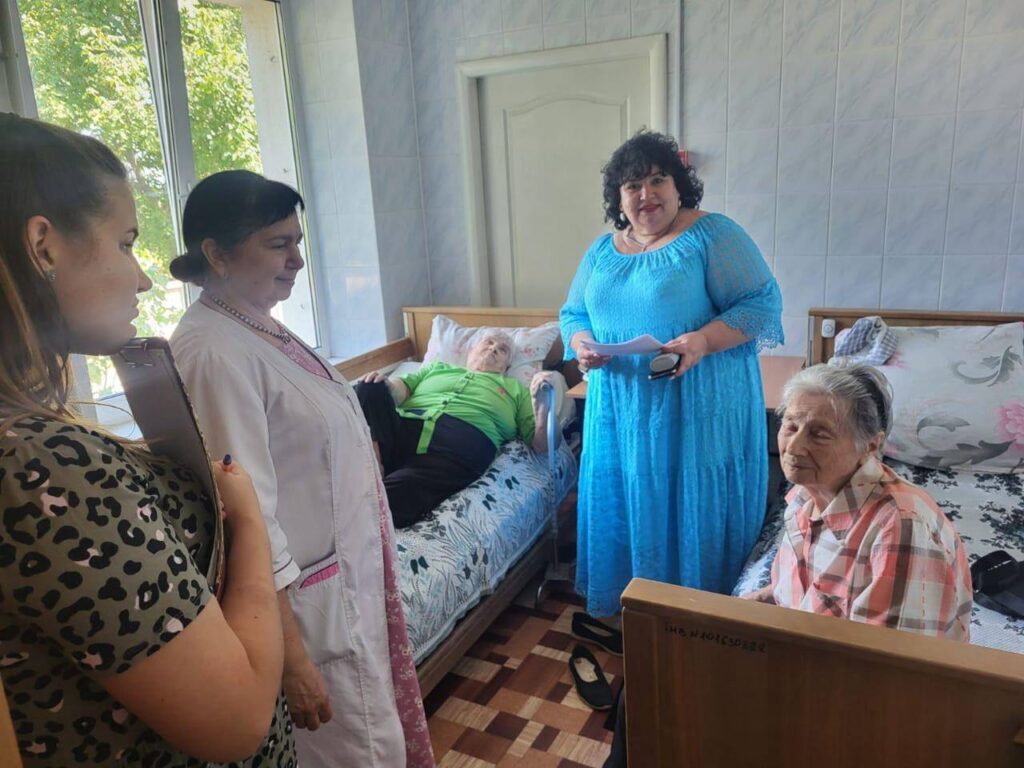
Recent battlefield developments have amplified the urgency. Russian forces achieved a narrow but significant breakthrough north of Pokrovsk, advancing up to 17 km and seizing positions threatening Ukrainian supply lines. Another push near Dobropillia reached the Dobropillia–Kramatorsk highway, a key route for military logistics.
While Ukrainian commanders report stabilizing the front with reinforcements, analysts warn these advances could shift the strategic balance and increase risks for nearby civilian areas, including Druzhkivka.
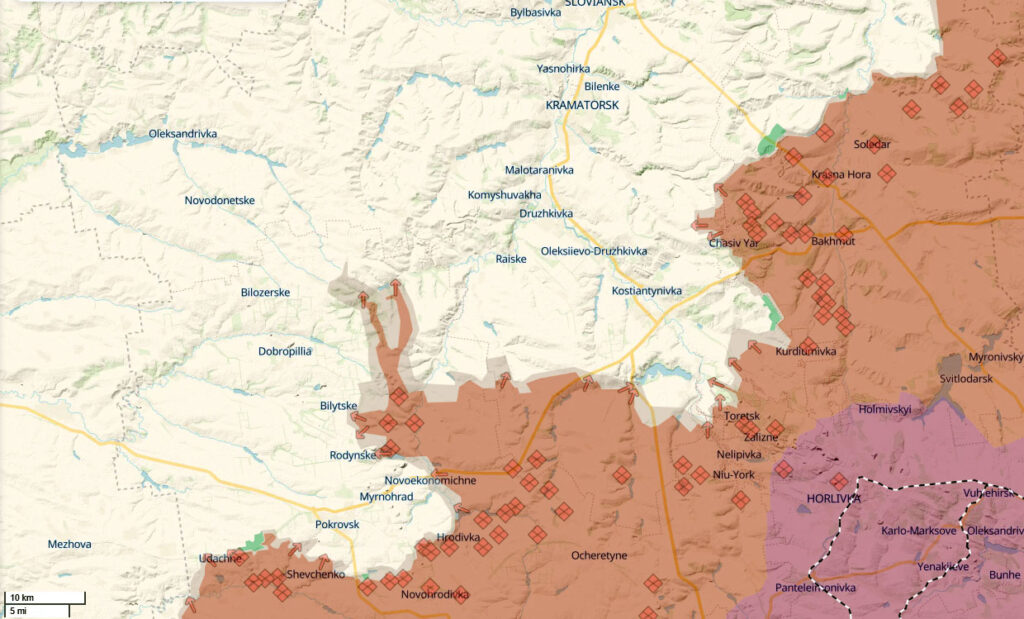
Mandatory evacuations began in March 2023 in Bakhmut during heavy fighting. Since then, similar operations have taken place in Kryvorizka, Dobropilska, Druzhkivska, Lymanska, and Bilozerska communities as the front line has approached.
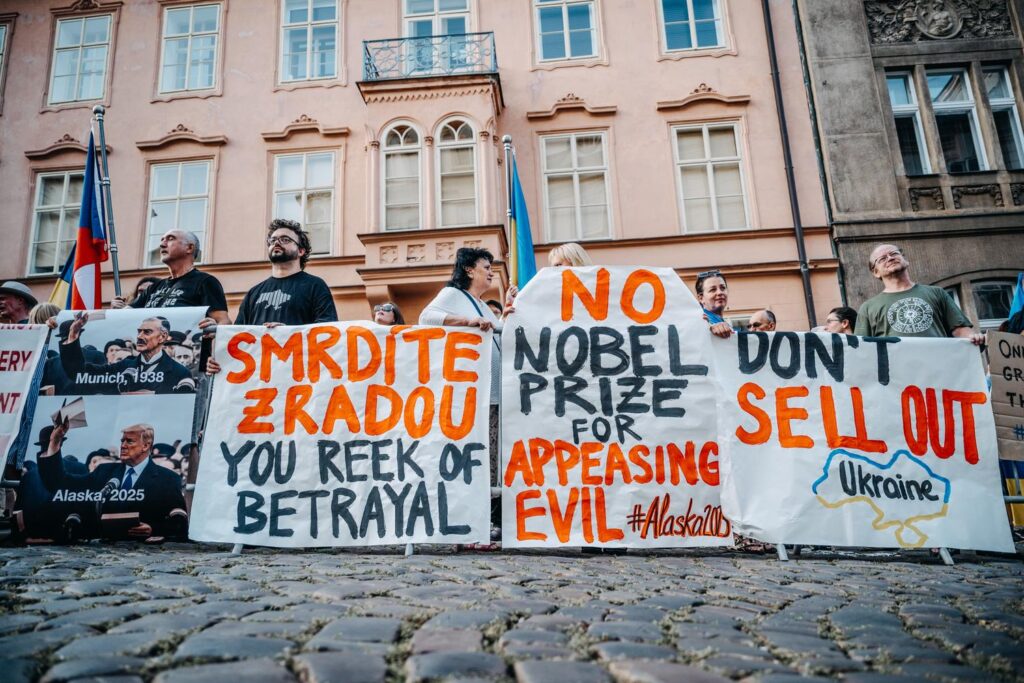

When Donald Trump and Vladimir Putin meet in Alaska this Friday, the headlines will focus on the show: a US president hosting the Russian leader in a state once sold by the Russian Empire, with Ukraine’s fate hanging in the balance. But what’s invisible to many is a fundamental problem. The two men are not even negotiating the same war.
Trump and his advisers frame the war as a territorial dispute.
In Trump’s mind, ending the war is a matter of finding the right chunk of land to trade, a deal that can be signed quickly, sold to voters, and wrapped up before the next election cycle.
Putin’s view is entirely different. For him, this war is not about lines on a map. It is about the structure of Europe’s security order. His core demand, repeated for more than a decade, is a legally binding halt to NATO expansion, not just for Ukraine, but as a principle. That means rewriting the post–Cold War rules so that Moscow has a permanent veto over the alliances its neighbors may join.
It is, in effect, a constitutional rewrite of Europe’s security system.
But Putin’s demands go far beyond strategic reordering. According to Russian officials, Moscow seeks Ukraine’s complete “demilitarization,” “denazification”—Putin’s euphemism for regime change—and permanent “neutrality” barring any Western security guarantees.
Russia also wants all sanctions lifted and NATO forces rolled back from Eastern Europe entirely.
In other words, Putin is not negotiating over Ukrainian territory. He is negotiating over whether Ukraine will continue to exist as an independent state.
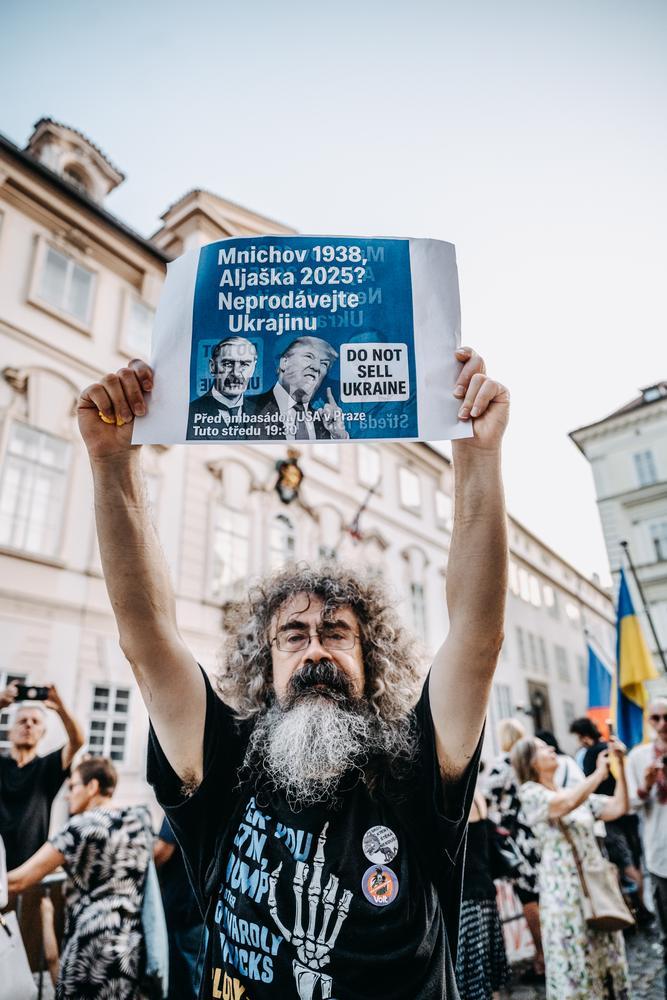
This fundamental mismatch leaves Ukraine in an impossible position. Trump is willing to trade away frozen conflict lines, delayed NATO membership, and limited sanctions relief. But Ukraine needs what Putin refuses to give: genuine security guarantees, territorial integrity, and the sovereign right to choose its own alliances.
For Ukraine, accepting Putin’s terms would mean national suicide disguised as negotiation.
These are not positions Ukraine can compromise on—they are requirements for survival as an independent nation. Yet they are precisely what Trump’s deal-making approach treats as negotiable.
There is no shortage of historical warnings about what happens when talks are built on such mismatches. Land swaps have been tried before as a way to paper over deeper disputes.
In each case, the failure came from mistaking a strategic conflict for a cartographic one.
There is a deeper risk that analysts have largely overlooked: Trump is negotiating with his own misunderstanding of Putin’s objectives. Because he believes the dispute can be solved by trading territory, he will interpret any territorial discussion as progress.
Putin, meanwhile, will see territorial concessions only as a means to secure the larger prize of a rewritten security order.
This misunderstanding becomes Putin’s greatest asset. Russian analysts describe Trump’s dealmaking approach as a “can’t-lose proposition” for Moscow. Putin can appear reasonable and open to compromise while presenting terms designed to eliminate Ukrainian independence.
Even if Trump rejects specific demands, Putin achieves his goal of being treated as Ukraine’s equal in determining the country’s future.
Trump and Putin will leave Alaska believing they have moved closer to a deal, but they will be moving along two separate tracks that never meet.
If this were merely a matter of clashing goals, careful preparation could at least surface the differences and test for overlap. But here too, the asymmetry is visible. Putin arrives in Alaska with a tightly controlled plan, informed by months of private discussions with his closest advisers, and with clear red lines. Trump arrives without a detailed framework.
Successful summits rarely happen spontaneously.
Alaska has none of this. The meeting was triggered by a visit from Steve Witkoff, a real estate developer turned envoy, who came back from Moscow with little more than a handshake agreement to meet.
That imbalance gives Putin the advantage. He can use the summit to appear open and constructive while presenting terms designed to lock in strategic gains.
Even if Trump refuses those terms, Putin will have succeeded in demonstrating to his domestic audience, and to wavering countries in the Global South, that Russia is negotiating directly with Washington, sidelining Kyiv.
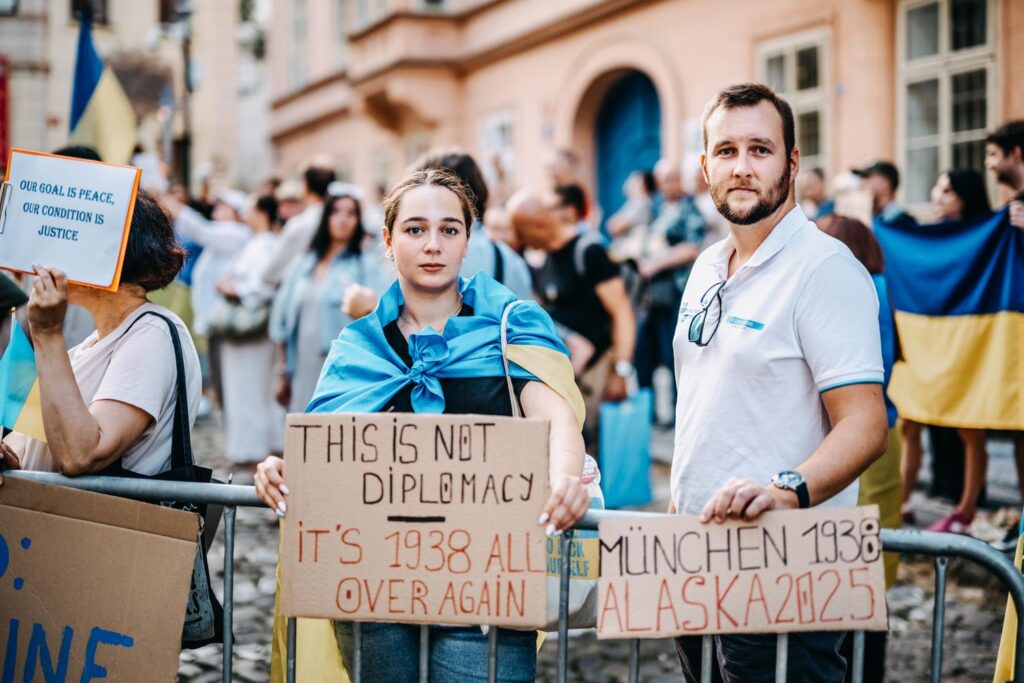
Time itself favors Putin. Trump is thinking in months, hoping for a quick foreign policy win before the 2026 midterms.
Putin thinks in decades. His inner circle, according to Russian sources, has told him that Ukrainian resistance will collapse within months if Russia maintains military pressure.
Even a temporary ceasefire would allow his forces to regroup, while sanctions fatigue erodes Western unity.
This is why a meeting that produces no concrete concessions from Moscow can still be useful to both men, but deeply damaging to Ukraine.
The real danger of Alaska is not that it produces a signed surrender. The danger is that it produces the illusion of progress.
Then there is Alaska itself. Meeting on American soil might seem like a show of strength from Trump, but to Putin, it means something else. Alaska was once Russian territory. Hosting the summit there sends an unintended message: that borders are temporary and land can be transferred through negotiation. In a war where Russia’s central claim is that borders can be rewritten by force, this is a gift.
Diplomats understand the power of location. In 2010, Serbia and Kosovo’s EU-sponsored talks were held in Brussels precisely to avoid symbolic claims to sovereignty. Choosing Alaska to discuss Ukraine’s future undermines the very principle the US claims to defend: that states have the right to keep their internationally recognized borders.
The real danger of Alaska is not that it produces a signed surrender. The danger is that it produces the illusion of progress.
Trump could emerge declaring the talks a first step toward peace, while Putin uses the meeting to reinforce his narrative: that Washington, not Kyiv, is the true counterparty in this war, and that Russia’s demands are the baseline for any serious negotiation.
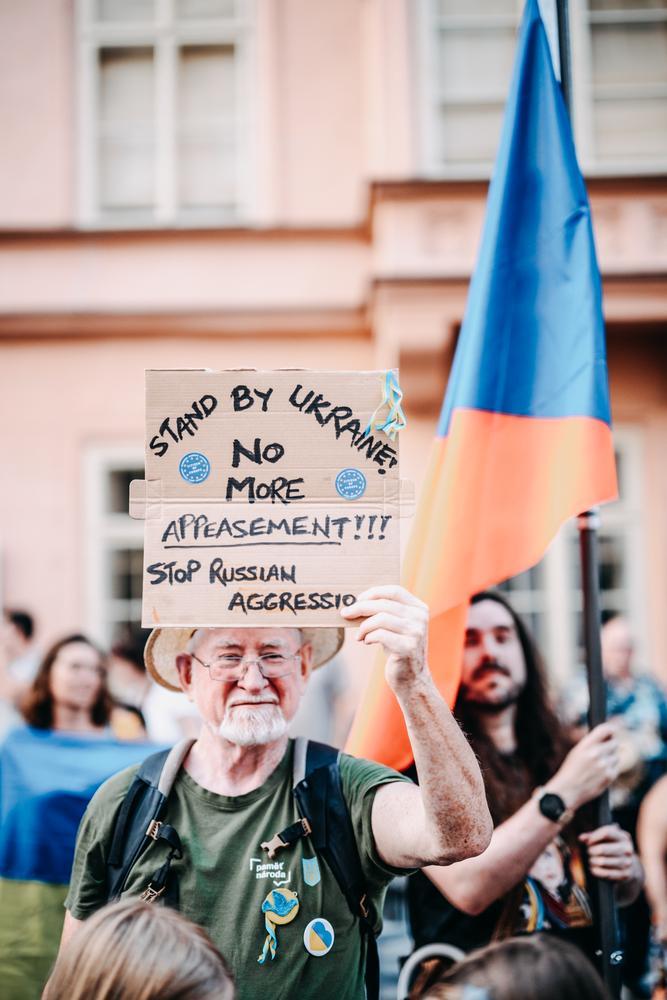
Could Alaska succeed? Only if both leaders arrived with a shared understanding of the core dispute, a set of pre-negotiated principles, and Ukraine’s active participation.
None of those conditions exist.
Without them, the meeting is not a step toward resolution but a set piece in two domestic political dramas: Trump’s need to appear as the great dealmaker, and Putin’s need to appear as the indispensable architect of Europe’s future.
But the stakes are higher than political theater. Trump’s misunderstanding could lead him to pressure Ukraine into accepting a “peace” that eliminates its independence while allowing Putin to claim he negotiated rather than conquered.
The summit’s real risk is that Trump will declare victory while Putin advances his goal of eliminating Ukrainian independence, creating a framework that destroys Ukraine while calling it diplomacy.
That is why the Alaska summit may be remembered not as a turning point toward peace, but as the moment when the West negotiated away a democracy’s right to exist.


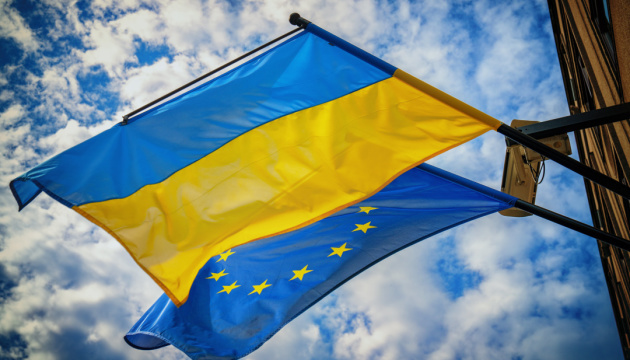

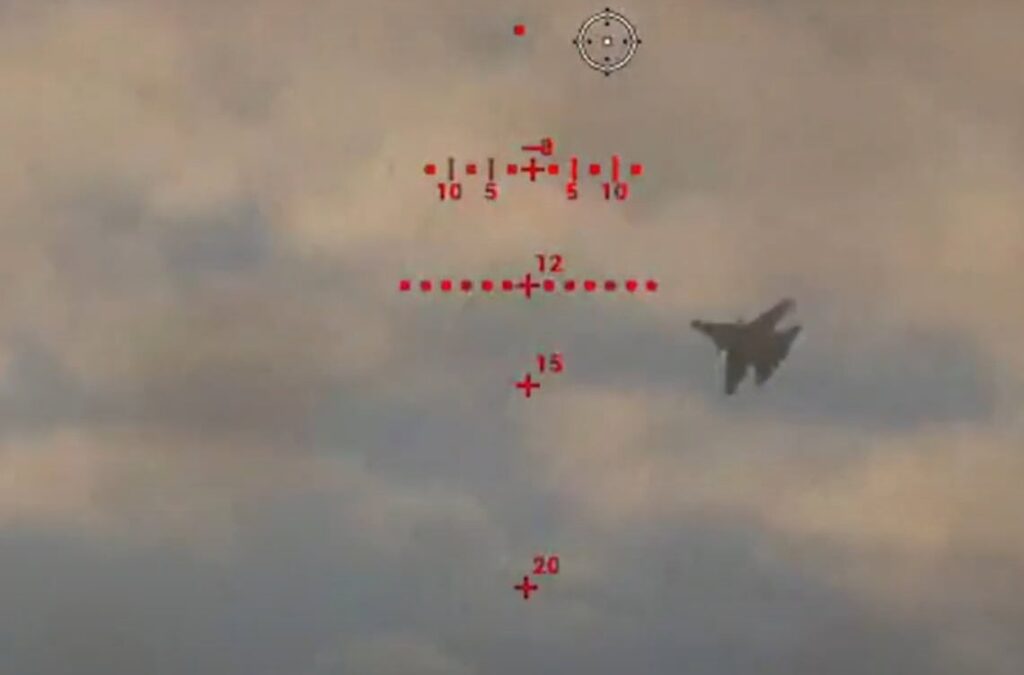

A Russian Su-30SM multirole fighter jet has likely crashed in the Black Sea southeast of Zmiinyi (Snake) Island (Odesa Oblast), according to the Ukrainian Navy.
Naval intelligence intercepted radio communications indicating the loss of contact with the aircraft during a mission. The cause of the incident remains unknown.
Russian forces have launched a search-and-rescue operation; debris has been spotted on the sea surface, but the pilot has not been found.
The Su-30SM is one of the Russian military’s most capable 4th-generation fighters, used for air superiority, long-range patrols, escort missions, radar surveillance, and command-and-control.
FlightGlobal’s 2025 world air forces directory lists 365 Su-27/30/35 fighters in Russian service (exact Su-30SM numbers are not public). Each Su-30SM is estimated to cost between $35 million and $50 million, making every loss a major hit to Russia’s high-value combat fleet.
The aircraft has been used extensively in the war against Ukraine, including for the launch of Kh-31P and Kh-58 anti-radiation missiles aimed at suppressing Ukrainian air defenses.
Ukraine has reported multiple Su-30SM shootdowns and ground destructions since the full-scale invasion began:
The possible downing of another Su-30SM underscores Ukraine’s ability to inflict attrition on Russia’s front-line combat aviation. With high unit costs and a shrinking pool of trained aircrews, each loss erodes Russia’s air combat capability — particularly in contested zones like the Black Sea.

Orthodox Christians are taking part in three days of prayer for peace, with hope that the prayers ‘will touch the hearts of our leaders’

© AP
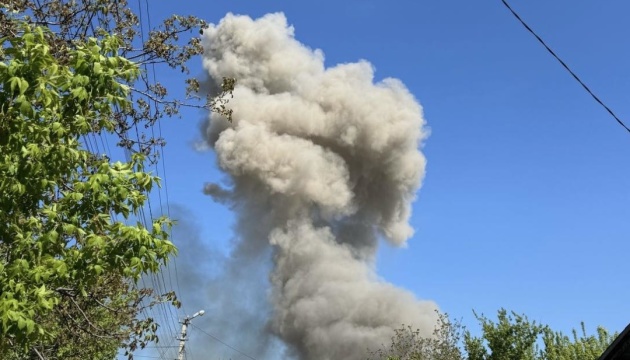

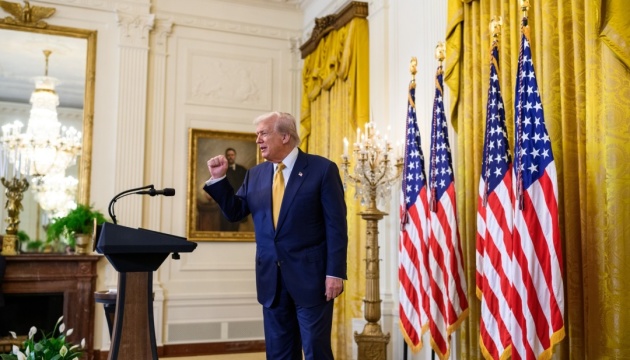

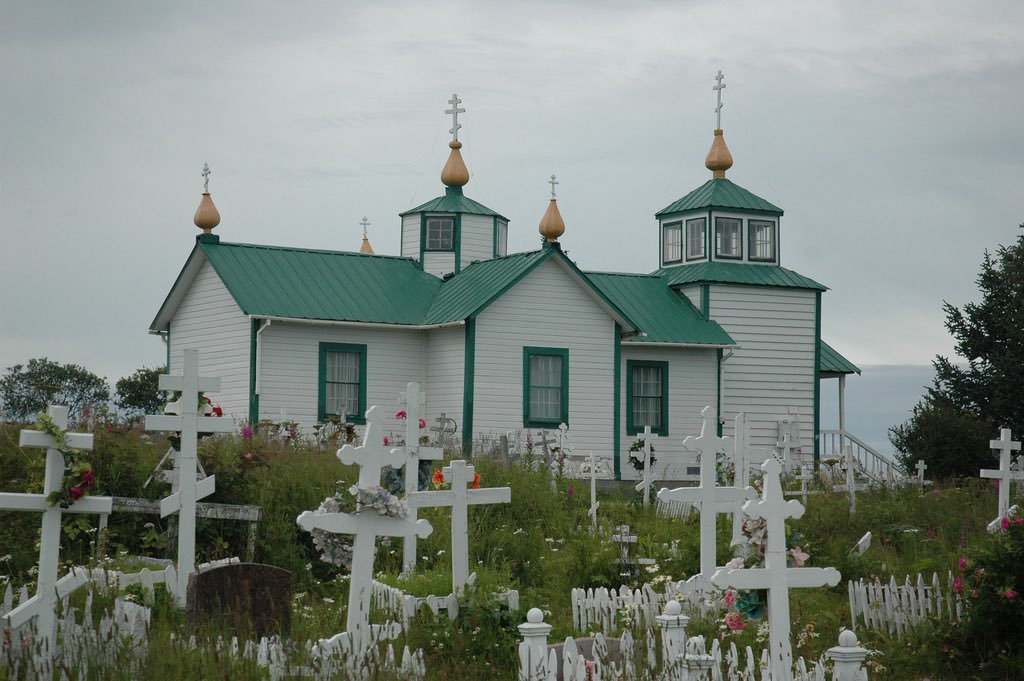

The upcoming summit between US President Trump and Russian President Putin in Anchorage, Alaska, has reignited Russian imperial rhetoric precisely as Moscow seeks to demonstrate its global reach while pressuring Ukraine to cede territory.
The summit venue has brought renewed attention to longstanding Russian territorial claims, with statements resurfacing in which Russian state and media figures suggest the US state belongs to Moscow ahead of Friday’s meeting.
State television propagandist Olga Skabeyeva has referred to the state as “our Alaska” during broadcasts in 2024. The same year, Deputy Security Council Chair Dmitry Medvedev joked on social media about going to war with the US over the territory.
Kremlin negotiator Kirill Dmitriev described Alaska as “an American of Russian origin” during recent summit discussions. State Duma Speaker Vyacheslav Volodin previously warned that Moscow would lay claim to the state if Washington froze Russian assets abroad.
In 2022, Billboards reading “Alaska Is Ours!” appeared in Krasnoyarsk, Siberia.
Alaska was colonized by Russia from 1799 to 1867, and was administered by about 700 Russians across a territory larger than Texas. Russia sold Alaska to the United States in 1867 for $7.2 million following Russia’s defeat in the Crimean War. Nearly all Russian settlers left after the purchase, though Russian Orthodox churches remain throughout the state.
The state’s closest point lies just 3.8 kilometers from Russia across the Bering Strait, between Little Diomede Island (US) and Big Diomede Island (Russia). There are 89 kilometers between the mainlands of the two countries.
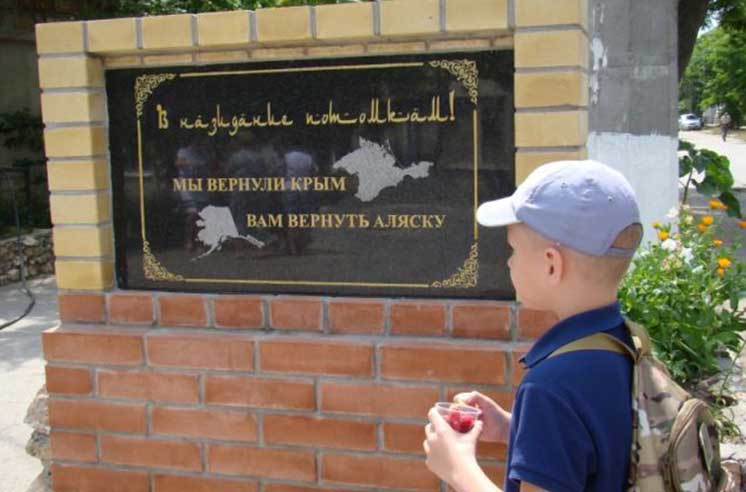
Trump and Putin will meet Friday in Anchorage to discuss ending Russia’s war in Ukraine. Trump has indicated he expects “some land-swapping” in any potential deal, while Putin demands Ukraine abandon NATO aspirations and recognize Russian territorial conquests.
In the press conference about the summit on 11 August, President Trump appeared to slip up, referring to the meeting location as “Russia”.
Ukrainian President Volodymyr Zelenskyy was not initially invited to the summit, though the White House is considering extending an invitation.
The summit will reportedly include discussions of a potential minerals deal, with Trump expected to present resource partnership proposals to Putin during the meeting, according to The Telegraph.
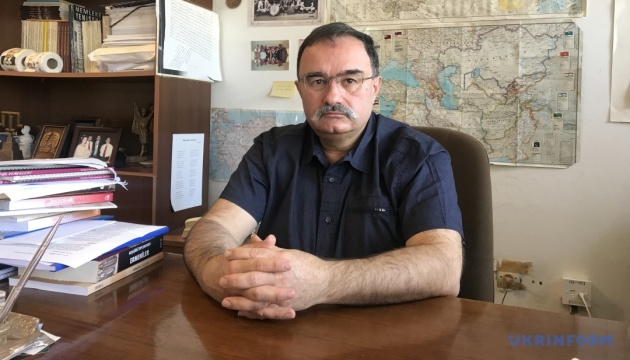

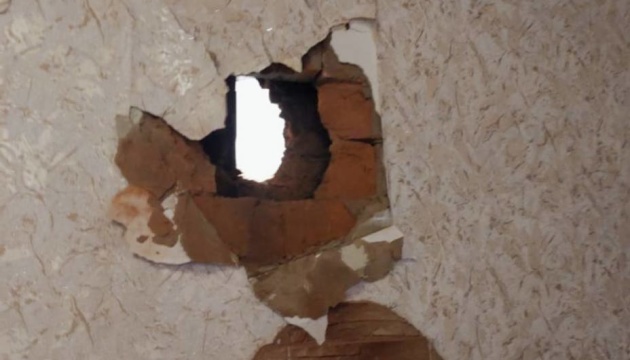

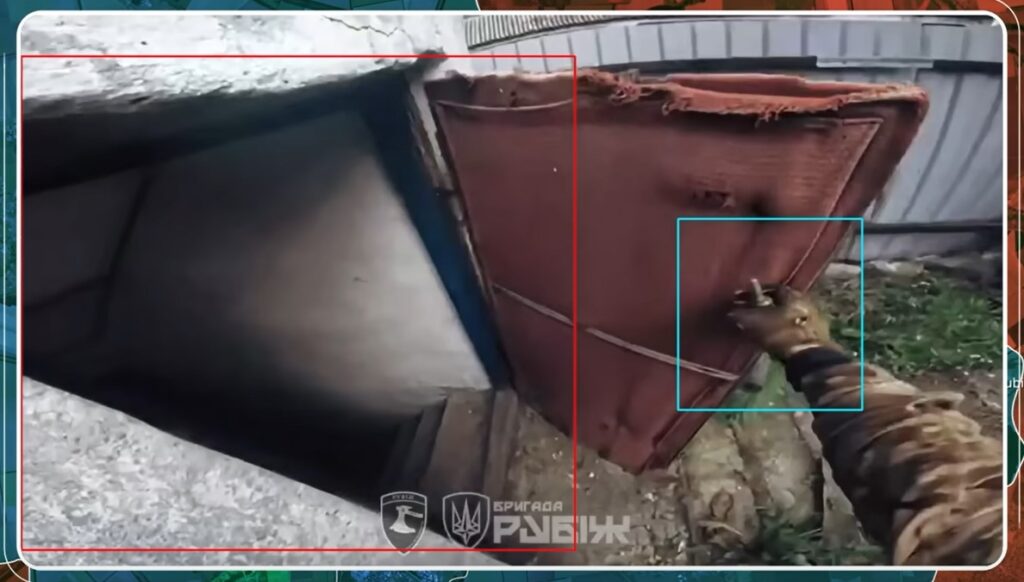

Today, there are important updates from the Pokrovsk direction. Here, on the eastern flank, the Russian forces conducted a massive push to cut off Ukrainian supply lines to Pokrovsk and starve out the defenders. However, Russians quickly got stuck in fortifications that guard the back of the Ukrainian defense line, with intense close-quarters battles breaking out.
In the latest adjustment of their summer offensive, Russian forces are now concentrating their efforts on encircling Pokrovsk from the east. Despite being initially promising, the failed encirclement efforts from the west and unsuccessful infiltration attempts from the south were both successfully pushed back by Ukrainian defenders.
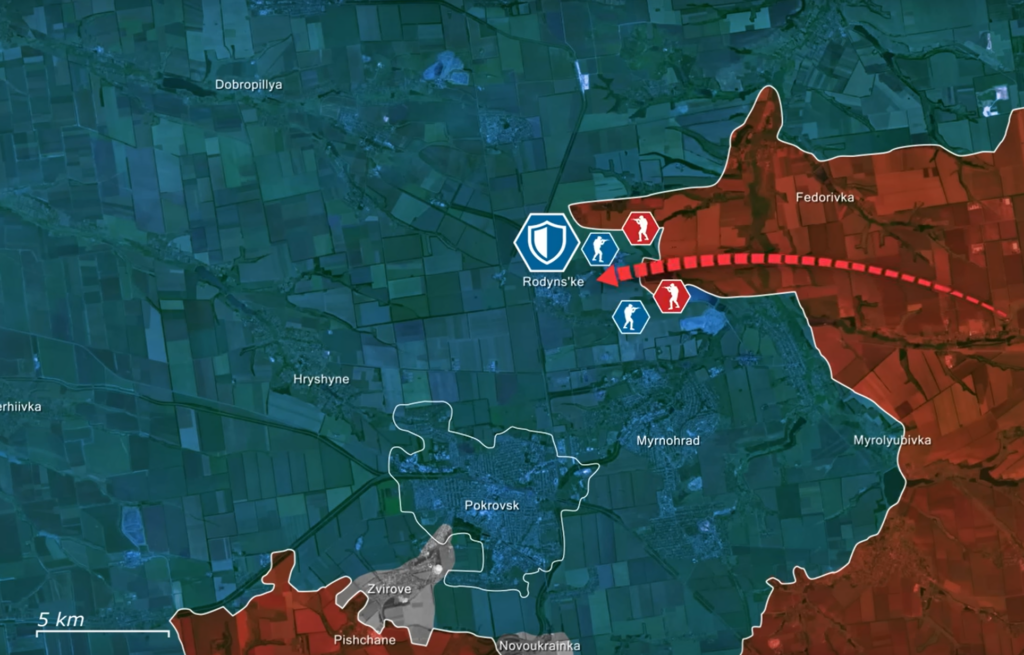
Ukrainians improved their tactical standing, stalling further enemy momentum, which changed Russia’s strategy toward targeting logistics on the western flank. However, the same cannot be said for the eastern flank. After making headway there, Russian forces rapidly shifted their focus to this sector, capitalizing on their momentum to push deeper and reach the strategically vital settlement of Rodynske.
Their objective is now clear: cut supply lines, threaten Pokrovsk and Myrnohrad from behind, and force the Ukrainian defense into a semi-encircled position. Rodynske has emerged as a focal point in Russia’s operational plan due to its position directly behind Pokrovsk and Myrnohrad, which allows it to serve as a logistical and tactical keystone for both towns. Capturing it would open a dangerous axis of advance from the rear, collapsing supply routes and placing additional pressure on Ukrainian units holding the line.
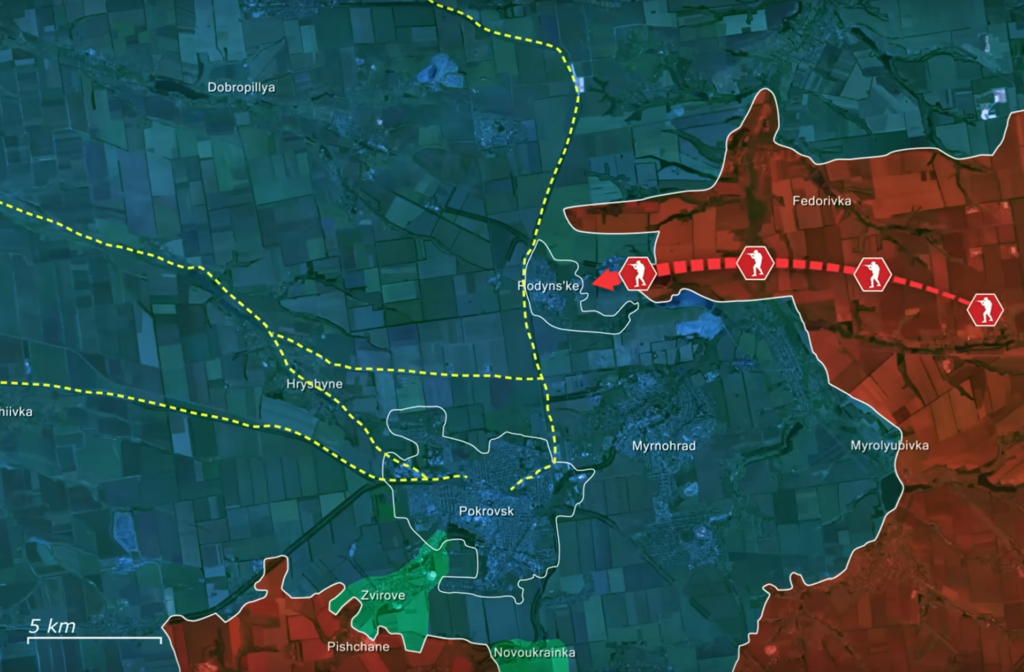
Recognizing this, Russian commanders are pouring reinforcements into the area, prioritizing the capture of the dense urban environment of Rodynske, which would offer both protection for troop concentrations and ideal conditions for the launch of drone operations. If secured, Russian drone teams positioned in Rodynske could launch strikes with ease across a 15 to 25 kilometer radius, hitting key Ukrainian staging areas and logistical hubs.
If we look at the topographic map, we can see that the immediate threat could easily extend west toward Hryshyne, which sits in a lowland and would be vulnerable to attack. Additionally, this would allow the Russians to gain access to the same high ground that Pokrovsk is sitting on and would open up attack routes directly from behind.
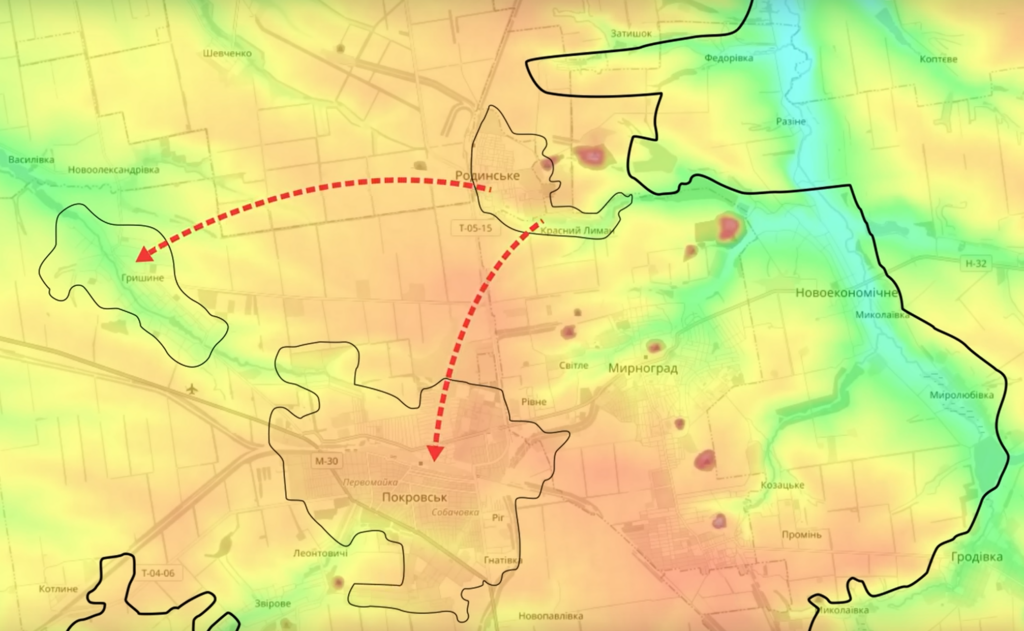
For now, however, the main Russian effort remains squarely focused on breaking Ukrainian resistance in Rodynske. The fierce battle for the settlement has already begun, with high-intensity engagements playing out on its eastern approaches. Geolocated combat footage paints a clear picture of the fighting, as in one clip, a Ukrainian marine fires an AT-4 grenade launcher at point-blank range into an underground cellar where Russian soldiers had holed up in. After the explosion had opened up the underground area, a Vampire hexacopter was then able to drop a heavy mine from above, obliterating the Russian position.
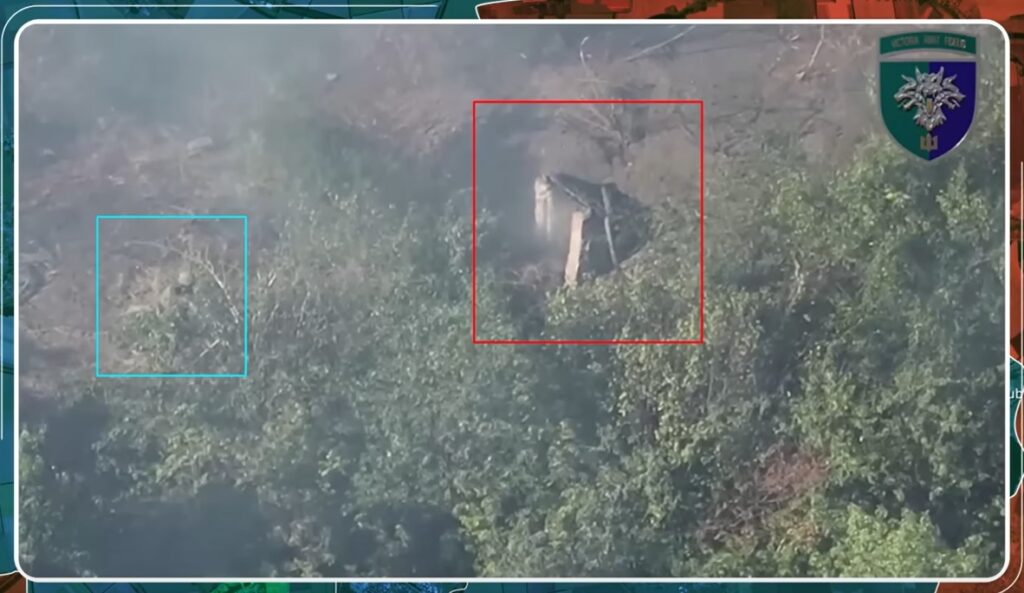
Elsewhere, the Starfall unit of the 14th Operational Brigade of Ukraine’s National Guard is shown operating east of Rodynske, targeting Russian troops hiding near a mine with drone-dropped explosives to stop their advance.
More particularly brutal GoPro footage captures two Ukrainian soldiers responding to signs of an enemy presence. Calm and calculated, they discover two Russian assault troops hiding in a cellar. Speaking fluent Russian, the Ukrainians momentarily confuse the intruders before eliminating them with grenades tossed inside. The same team later clears a nearby house, eliminates the Russian soldiers inside, and seizes a captured assault rifle.
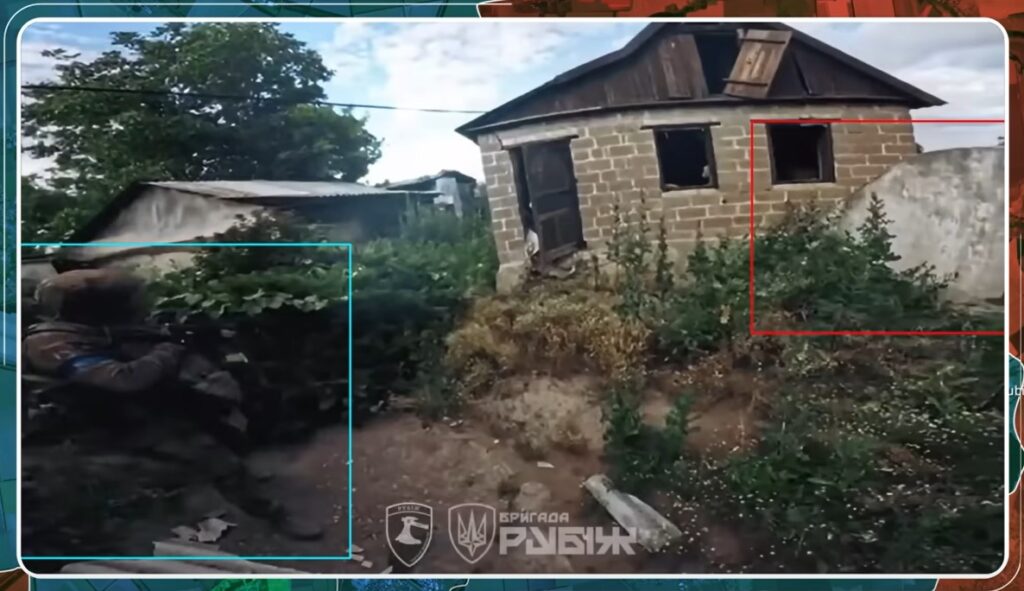
Overall, Pokrovsk remains the hottest section of the frontline and the focal point of Russia’s summer campaign. The Russians are determined to establish a foothold in the paved neighborhoods before the fall rains make any approach on soft ground impossible, and their pivot to the east has already yielded dangerous momentum.
Yet this shift is now being met with fierce Ukrainian resistance centered on Rodynske, quickly growing to be of extreme importance. Its defense is about protecting the entire Pokrovsk–Myrnohrad sector from collapse, as if Rodynske falls, the door to encirclement opens. For now, however, Ukrainian forces are holding, fighting from house to house, and striking back with every tool available. The battle is far from over, but the outcome in Rodynske may well decide the fate of Pokrovsk.
In our regular frontline report, we pair up with the military blogger Reporting from Ukraine to keep you informed about what is happening on the battlefield in the Russo-Ukrainian war.
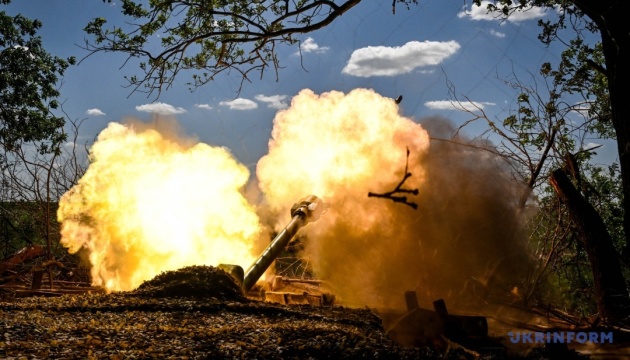


Editorial: When Putin declares victory, as now looks likely, the question of how willing the ‘coalition of the willing’ will be in its continued defence of Ukraine is a crucial one that few seem ready to answer – and one on which Keir Starmer must continue to take a lead

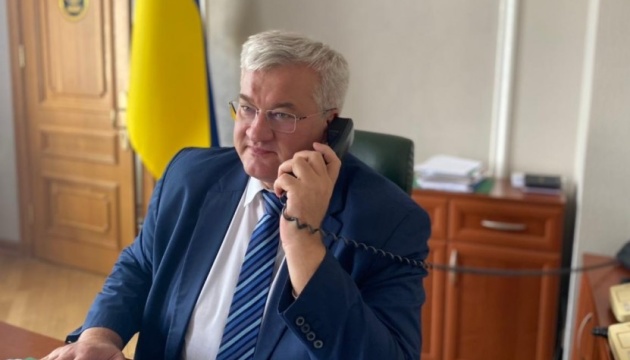

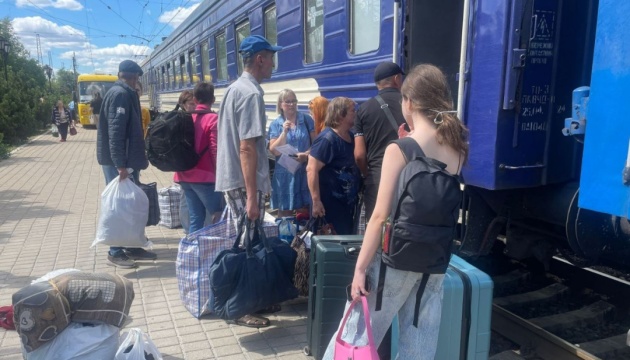


© AFP/Getty